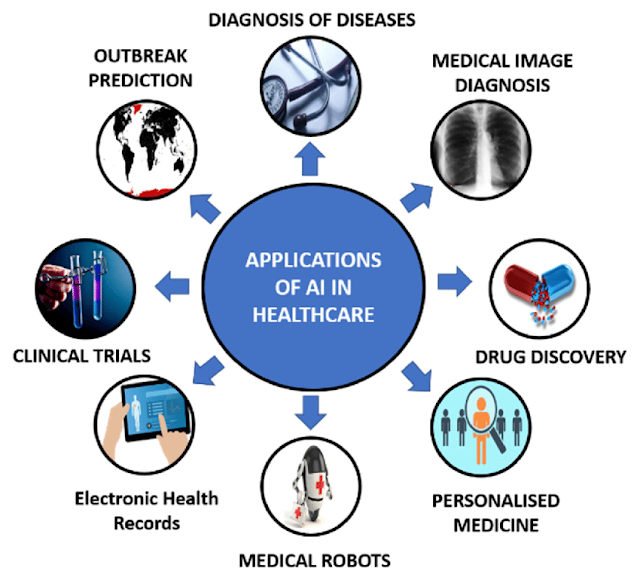Artificial Intelligence (AI) has emerged as a transformative force in the healthcare industry, unlocking new possibilities and revolutionizing the way healthcare organizations operate. With its ability to analyze vast amounts of data, identify patterns, and make predictions, AI has the potential to drive significant advancements in patient care, diagnostics, and administrative processes.
One of the key areas where AI is making a profound impact is in business applications within healthcare. In this article, we will explore some of the major business applications for AI in healthcare and how they are unlocking the potential for improved outcomes and efficiencies.
1. Streamlining Administrative Processes: Healthcare organizations are typically burdened with numerous administrative tasks such as appointment scheduling, medical coding, and insurance claims processing. AI can automate these processes, reducing the administrative burden, minimizing errors, and freeing up valuable time for healthcare professionals to focus on patient care. Through natural language processing and machine learning algorithms, AI-powered chatbots and virtual assistants can handle routine inquiries, helping patients schedule appointments, and provide basic medical information. This streamlining of administrative processes not only improves efficiency but also enhances the overall patient experience.
2. Enhancing Diagnostic Accuracy: AI-powered algorithms have demonstrated remarkable accuracy in analyzing medical images such as X-rays, CT scans, and MRIs. By leveraging deep learning and computer vision techniques, AI can assist radiologists in identifying anomalies or abnormalities that might be easily missed by the human eye. This not only improves diagnostic accuracy but also enables faster and more precise treatment plans. Additionally, AI can aid in identifying potential drug interactions, allergies, and adverse reactions, thereby enhancing patient safety and reducing medication errors.
3. Predictive Analytics for Proactive Care: AI algorithms can analyze vast amounts of patient data to identify patterns and make predictions regarding disease progression, patient outcomes, and healthcare utilization. By leveraging predictive analytics, healthcare organizations can take a proactive approach to patient care, identifying high-risk individuals and intervening earlier to prevent complications or hospital readmission. This data-driven approach can also help in optimizing resource allocation, reducing costs, and enhancing operational planning.
4. Personalized Medicine: AI enables the customization of treatment plans based on a patient's unique characteristics, genetic makeup, and medical history. By analyzing vast amounts of genomics, clinical, and lifestyle data, AI algorithms can identify personalized treatment options and predict the likelihood of a positive response to specific therapies. This precision medicine approach not only improves treatment outcomes but also reduces adverse events and enhances patient satisfaction.
5. Fraud Detection and Risk Management: Healthcare organizations face significant challenges in detecting fraud, waste, and abuse in the system. AI can be utilized to analyze vast amounts of healthcare data, flagging suspicious patterns and identifying potential fraudulent activities. By leveraging machine learning algorithms and anomaly detection techniques, AI systems can help in preventing fraudulent billing, insurance claims fraud, and other financial misconducts. Additionally, AI can aid in risk management and cybersecurity, ensuring patient data privacy and protecting against potential threats.
It is clear that the business applications of AI in healthcare have tremendous potential to drive innovation, improve patient outcomes, and optimize operational efficiencies. Organizations that embrace AI technology and invest in the necessary skills and infrastructure are well-positioned to deliver higher-quality care, reduce costs, and enhance patient satisfaction.
To meet the growing demand for professionals with expertise in integrating AI into healthcare business applications, many institutions now offer specialized certificate programs. These programs provide participants with the knowledge and skills needed to navigate the intersection of AI and healthcare, enabling them to contribute to the transformation of the industry. By earning a Certificate of Specialization in Business Applications for AI in Healthcare, professionals can position themselves at the forefront of this evolving field, equipped to drive innovation and leverage AI technologies for improved patient care and operational excellence.
In conclusion, unlocking the potential of AI in healthcare requires a deep understanding of its business applications. From streamlining administrative processes to enhancing diagnostics and enabling personalized medicine, AI is poised to revolutionize healthcare operations. By investing in specialized training and earning a certificate in Business Applications for AI in Healthcare, professionals can harness the power of AI to unlock new possibilities and drive positive change in the healthcare industry.


Post a Comment
Full Name :
Adress:
Contact :
Comment: